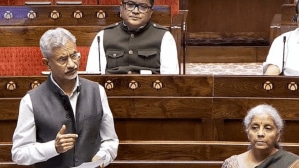HC commutes death sentence of man convicted for rape, murder of daughter: ‘not rarest of rare case’
Court held that while there was no doubt about the brutal and heinous nature of the crime, the fact remains that the man has no criminal antecedents, hails from a poor socio-economic background, and his conduct inside the jail has been satisfactory.
 On sentencing, the bench invoked Swamy Shraddananda v. State of Karnataka (2008), stating that while the crime was brutal, it did not fall into the “rarest of rare” category warranting the death penalty.
On sentencing, the bench invoked Swamy Shraddananda v. State of Karnataka (2008), stating that while the crime was brutal, it did not fall into the “rarest of rare” category warranting the death penalty.
The Punjab and Haryana High Court Thursday commuted the death sentence awarded to a man, for raping and murdering his six-year-old daughter in 2020, into life imprisonment without remission for 30 years.
A division bench of Justices Gurvinder Singh Gill and Jasjit Singh Bedi ruled that while the prosecution had established a strong chain of circumstantial evidence linking the accused to the crime, the case did not meet the “rarest of rare” threshold required for capital punishment
“While there is no doubt about the brutal and heinous nature of the crime committed by the accused who is none other than the father of the deceased, the fact remains that he has no criminal antecedents, hails from a poor socio-economic background, and his conduct inside the jail has been satisfactory. Further, at the time of the crime, he was 35 years years old,” the bench said.
The petitioner was convicted under Section 302 of the Indian Penal Code (IPC) and Section 6 of the Protection of Children from Sexual Offences (POCSO) Act by an Amritsar court in August 2024. The case dates back to January 2020, when the petitioner allegedly took his daughter from her maternal home and later informed the victim’s uncle that he had killed her. Her body was found hanging from a tree near a canal bridge in a village. A post-mortem confirmed rape.
His wife, who had been living with her parents as he used to get drunk and beat her, initially said he must have killed their six-year-old daughter. However, during cross-examination in court, she changed her statement, saying he loved all three of their children and would never brutalize any of them.
The high court, citing Sharad Biridhichand Sarda v. State of Maharashtra (1984), stressed the importance of a complete chain of circumstances in cases based on circumstantial evidence. It found that the petitioner failed to provide any explanation for what happened after he took the child away.
The court noted that the petitioner was the last person seen with the victim. His silence on her whereabouts further strengthened the prosecution’s case.
“Last seen theory is certainly applicable in a crime like the one on hand, which was carried out on sly and in secrecy during night, in the absence of availability of any eye-witnesses. Thus, if a person is last seen with the deceased, he must offer an explanation as to how and when he parted company,” the court said.
The court added that “once it has been established beyond doubt that the accused was seen in the company of the deceased, having taken her from her mother the previous evening, the burden lay on him to explain as to how she came to be raped and murdered in terms of Section 106 of the Evidence Act, and he has not been able to discharge the burden.”
The court also addressed the absence of DNA profiling, a key argument raised by petitioner’s counsel. While acknowledging that DNA evidence could have provided additional confirmation, the bench ruled that its absence did not weaken the case.
“It is a settled proposition of law that merely because the potency test of an accused has not been conducted, and his DNA profiling has not been done, cannot be a basis for the acquittal of the accused once there is sufficient other material for the Court to reach a conclusion of the guilt of the accused,” the court observed.
The petitioner’s lawyer also challenged the reliability of an alleged extra-judicial confession and discrepancies in witness testimonies. However, the court found that these inconsistencies were not substantial enough to overturn the conviction.
On sentencing, the bench invoked Swamy Shraddananda v. State of Karnataka (2008), stating that while the crime was brutal, it did not fall into the “rarest of rare” category warranting the death penalty.
The court, while upholding the sentence awarded to the petitioner under Section 06 of the POCSO Act, commuted the death sentence to life imprisonment with a condition that the petitioner would not be eligible for premature release for 30 years.
The state was represented by advocate Prabhdeep Singh Dhaliwal, while petitioner was defended by legal aid counsel Pradeep Prakash Chahar.












